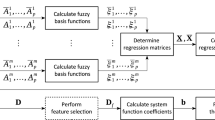Abstract
This paper proposes a novel anytime algorithm for the construction of a Hierarchical Fuzzy Rule Based System using an information theoretic approach to specialise rules that do not effectively model the decision space. The amount of uncertainty tolerated within the decision provides a single tuneable parameter to control the trade off between accuracy and interpretability. The algorithm is empirically compared with existing methods of function approximation and is demonstrated on a mobile robot application in simulation.
Similar content being viewed by others
References
Ogata K (1997) Morden control engineering. 3rd edn. Prentice-Hall, Englewood Chiffs
Zadeh LA (1994) Soft computing and fuzzy logic. IEEE Softw 11(1–6):48–56
Hagras H, Callaghan V, Colley M (2001) Outdoor mobile robot learning and adapation. IEEE Robot Autom Mag 8(3):53–69
Tunstel E, Lippincott T, Jamshidi M (1996) Introduction to fuzzy logic with application to mobile robotics. In: First national students conference of the national alliance of NASA University Research Centres. NC A&T State University, Greensboro, NC
Hoffman F, Pfister G (1997) Evolutionary design of a fuzzy knowledge base for a mobile robot. Int J Approx Reason 17(4):447–469
Holve R, Protzel P (1996) Generating fuzzy rules by learning from examples. In: Biennial conference of the North American Fuzzy Information Processing Society – NAFIPS. Berkeley, CA, USA
Zadeh LA (1988) Fuzzy logic. Computer 21(4):83–93
Bastian A (1994) How to handle the flexibility of linguistic variables with applications. Int J Uncertain Fuzz Knowledge-Based Syst 2(4):463–484
Alcala R, Casillas J, Cordón O, Herrera F (2001) Building fuzzy graphs: features and taxonomy of learning for non-grid-oriented fuzzy rule-based systems. J Intell Fuzzy Syst 11:99–119
Cordón O, Herrera F, Hoffmann F, Magdalena L (2001) Genetic fuzzy systems: evolutionary tuning and learning of fuzzy knowledge bases. World Scientific, Springer
Carse B, Fogarty TC, Munro A (1996) Evolutionary learning of fuzzy rule based controllers using genetic algorithms. Fuzz Sets Syst 80:273–293
Cordón O, Herrera F, Zwir I (2001) Fuzzy modeling by hierarchically built fuzzy rule bases. Int J Approx Reason 27:61–93
Melhuish C, Fogarty T (1994) Applying restricted mating policy to determine state space niches using immediate and delay reinforcement. In: Evolutionary computing, AISB Workshop. Leeds, UK
Holve R (1998) Investigation of automatic rule generation for hierarchical fuzzy systems. In: IEEE World congress on computational intelligence, FUZZ IEEE, Anchorage, Alaska
Grefenstette JJ, Ramsey CL (1982) An approach to anytime learning. In: Proceedings of the 9th international machine learning workshop. CA: Morgan Kaufmann, San Mateo
Shannon CE (1948) A mathematical theory of communication. Bell Syst Tech J 27:379–423, 623–656
Quinlan JR (1990) Induction of decision trees. In: Shavlik JW, Dietterich TG (eds) Readings in machine learning, 1990. Morgan Kaufmann, San Mateo
Al-sharhan S, Karray F, Gueaieb W, Basir O (2001) Fuzzy entropy: a brief survey. In: The 10th IEEE international fuzzy systems conference, Melbourne, Australia, pp 1135–1139
Zadeh LA (1965) Probability measures of fuzzy events. J Math Anal Appl 23:421–427
Holve R (1997) Rule Generation for hierarchical fuzzy systems. In: Proceedings of the annual conference of the North American Fuzzy Information Processing Society – NAFIPS, New York, pp 973–978
Hellendoorn H, Thomas C (1993) Defuzzifcation in fuzy controllers. J Intell Fuzz Syst 1:109–123
Cordón O, Herrera F, Zwir I (2000) A Hierarchical knowledge-based environment for linguistic modelling: models and iterative methodology. Department Of Computer Science and Artifical Intelligence Universidad de Granada, Granada Spain
Bardossy A, Duckstein L (1995) Fuzzy rule-based modelling with application to geophysical, biological and engineering systems. CRC Press, Boca Raton
Bezdek JC (1992) Fuzzy models for pattern recognition: methods that search for structures in Data. In: Pal S (ed) IEEE Press, 539 New York
Hagras H, Callagham V, Colley M (2004) Learning and adaption of an intelligent mobile robot navigator operating in unstructured environment based on a novel online Fuzzy-Genetic system. Fuzz Sets Syst 141(1):107–160
Soffiotti A, Ruspini EH, Konolige K (1999) Practical applications of fuzzy technologies. In: Zimmermann H-J (ed) Handbooks of fuzzy sets. Kluwer, Dodrecht, pp 185–205
Marichal GN, Acosta L, Moreno L, Méndez JA, Rodrigo JJ, Sigut M (2001) Obstacle avoidance for a mobile robot: a neuro-fuzzy approach. Fuzz Sets Syst 124(2):171–179
Furuhashi T, Nakaoka K, Uchikawa Y (2001) A study on fuzzy classifier systems for finding a control knowledge of multi-input systems. In: Herrera F, Verdegay J (eds) Genetic algorithms and soft computing, pp 489–502
Author information
Authors and Affiliations
Corresponding author
Rights and permissions
About this article
Cite this article
Waldock, A., Carse, B. & Melhuish, C. Hierarchical fuzzy rule based systems using an information theoretic approach. Soft Comput 10, 867–879 (2006). https://doi.org/10.1007/s00500-005-0013-y
Published:
Issue Date:
DOI: https://doi.org/10.1007/s00500-005-0013-y




